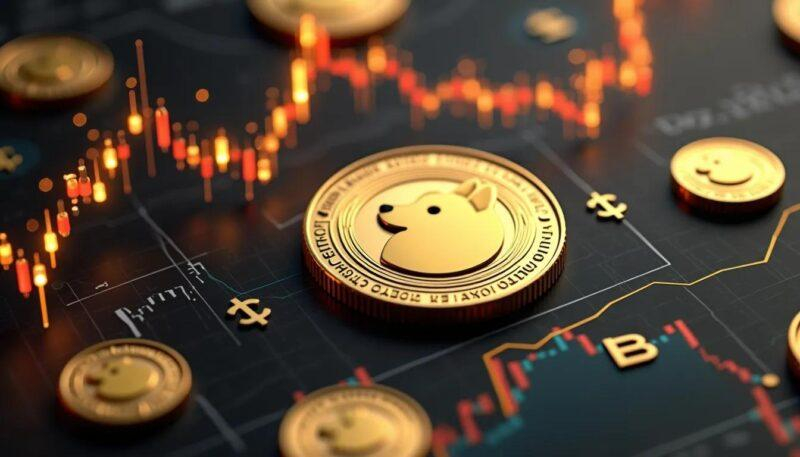In the bustling world of cryptocurrency, where fortunes can shift in a blink, the movements of so-called “whales” – those holding vast amounts of digital assets – often send ripples across the market. Dogecoin, once a meme-born token, has grown into a serious player with a dedicated community and significant trading volume. Understanding how to track the trails left by Dogecoin whales offers a unique window into market dynamics, revealing potential trends before they hit the headlines. This article delves into the art and science of following these elusive giants, equipping readers with the tools and insights needed to decode their next move without the need for a crystal ball.
Understanding Dogecoin Whales and Their Market Influence
In the nebulous world of cryptocurrency, Dogecoin whales-individuals or entities holding large amounts of DOGE-wield immense influence over market dynamics. Their every move, whether buying, selling, or transferring coins, can cause significant price fluctuations and alter market sentiment in an instant. Traders and enthusiasts alike monitor these patterns closely, knowing that whale activity often foreshadows market trends and potential volatility.
Tracking these giants requires a combination of technical tools and strategic insight. Blockchain explorers allow users to identify whale wallets by monitoring transaction sizes and frequency. Platforms such as Whale Alert aggregate and broadcast significant Dogecoin movements in real-time, offering a transparent window into whale behavior. Additionally, social media channels and crypto forums often reflect and speculate on whale activity, amplifying the market’s reaction and sometimes creating self-fulfilling prophecies.
- Use blockchain explorers: Identify large transfers and wallet balances.
- Follow real-time alerts: Tools like Whale Alert notify massive transactions immediately.
- Monitor sentiment: Discussion spikes on platforms like Twitter and Reddit often coincide with whale moves.
| Whale Action | Possible Market Impact |
|---|---|
| Bulk Purchase | Price surge & bullish sentiment |
| Massive Sale | Price drop & increased volatility |
| Wallet Transfer | Market uncertainty & speculation |
Tools and Techniques for Monitoring Large Dogecoin Transactions
Keeping an eye on massive Dogecoin transactions requires a blend of specialized tools that can sift through blockchain noise and spotlight whale movements. Platforms like Whale Alert and Dogecoin Block Explorers are indispensable for real-time transaction tracking, offering detailed insights into wallet activities across the network. By leveraging these tools, enthusiasts can detect shifts in market sentiment and anticipate potential price fluctuations driven by large-scale transfers.
Beyond real-time trackers, advanced analytics tools employ machine learning and data visualization techniques to highlight patterns in Dogecoin liquidity. For example, some dashboards consolidate data from multiple exchanges and wallets, displaying it through heatmaps and flow charts to make whale behavior more digestible. Utilizing alerts and customizable filters further empowers users to focus on transactions surpassing predefined thresholds, ensuring they never miss significant wallet moves.
| Tool/Technique | Purpose | Key Feature |
|---|---|---|
| Whale Alert | Real-time transaction monitoring | Instant notifications on large transfers |
| Dogecoin Block Explorers | Transaction verification and wallet tracking | Detailed transaction histories |
| Analytics Dashboards | Pattern detection & visualization | Customizable filters & alerts |
Interpreting Whale Behavior Through Blockchain Analysis
Blockchain analysis reveals a fascinating window into the cryptic world of whales-those massive Dogecoin holders whose transactions can sway market tides. By examining on-chain data, one can detect subtle patterns like accumulation phases, sudden large transfers, or dormancy periods that hint at whales’ intentions. These behavioral clues become valuable signals for traders and enthusiasts aiming to anticipate market movements beyond simple speculation.
Key indicators in whale behavior include transaction frequency, wallet clustering, and interaction with major exchanges. For instance, a spike in outgoing transfers coupled with wallet fragmentation might suggest a strategic sell-off or redistribution among smaller wallets to mask true intent. Conversely, a steady build-up in holdings paired with minimal outbound activity often signals long-term confidence or a preparatory stage before a major move.
- Transaction Size: Large transfers over 100,000 DOGE typically draw attention as whale activity
- Wallet Activity: Dormant wallets reactivating can indicate renewed interest or strategic repositioning
- Exchange Interactions: Movements between private wallets and exchanges often precede liquidity events
| Behavior | Possible Interpretation |
|---|---|
| Consolidation of DOGE in few wallets | Preparing for large market impact |
| Multiple small outgoing transfers | Obfuscating the real transaction intentions |
| Massive incoming transfers to exchange | Potential imminent sell-off |
Strategies to Leverage Whale Movements for Informed Trading Decisions
Understanding the subtle patterns behind large-scale Dogecoin transactions can transform your trading approach from guesswork to strategic precision. One effective method involves monitoring whale wallets through blockchain explorers and real-time trackers. By observing sudden spikes or drops in holdings, traders can anticipate potential market shifts before they hit mainstream news. Combining these insights with volume analysis gives a clearer picture of market sentiment and liquidity movement.
Integrating whales’ activities with technical tools makes your strategy more robust. Setting up alerts for significant wallet transfers or using proprietary analytics tools helps maintain an edge. Additionally, consider these actionable tactics:
- Diversify observation: Track multiple whale wallets to avoid false signals caused by isolated transactions.
- Follow wallet clusters: Groups of interconnected wallets often move in sync, indicating coordinated actions.
- Analyze timing: Notice patterns in time zones or recurring events tied to market behaviors.
| Whale Movement | Possible Market Signal | Suggested Action |
|---|---|---|
| Large Accumulation | Upcoming Price Surge | Consider Buying or Holding |
| Sudden Liquidation | Price Correction Imminent | Set Stop-Loss Orders |
| Frequent Transfers | Market Uncertainty | Exercise Caution |
Staying Ahead: Combining Whale Tracking with Broader Market Trends
Whale tracking, while immensely valuable, is only one piece of the puzzle when it comes to understanding Dogecoin’s price movements. To truly anticipate market shifts, it’s essential to interpret whale behavior in conjunction with broader market trends. This dual approach allows traders and enthusiasts to distinguish between isolated whale actions and those that signal a probable trend reversal or momentum surge in the market. Ignoring macroeconomic indicators or sentiment shifts can lead to misreading whale signals, resulting in missed opportunities or false alarms.
Integrating on-chain data with external market factors provides a more robust framework for decision-making. For instance, monitoring Bitcoin’s correlation with Dogecoin during major economic events or social media sentiment patterns can contextualize whale transactions. Are whales accumulating during bearish markets, signaling confidence, or are they offloading tokens amid broader sell-offs? Recognizing these nuances sharpens predictive accuracy, turning whale tracking into a strategic tool rather than a standalone metric.
Consider these key indicators for a holistic view:
- Market capitalization trends across altcoins
- Exchange inflow and outflow volumes
- Social media sentiment and influencer activity
- Global economic news impacting crypto regulations
| Indicator | What It Reveals | Relation to Whale Moves |
|---|---|---|
| Exchange Inflows | Tokens moved to exchanges for sale | Could indicate imminent large sell-offs by whales |
| Social Sentiment | Public interest and hype level | Whales might accumulate during low sentiment to maximize gains |
| Market Cap Trends | Overall health of the altcoin ecosystem | Triggers whale entry or exit strategies broadly |
Q&A
Q&A: Following the Trail – How to Track Dogecoin Whales’ Moves
Q1: What exactly is a “Dogecoin whale”?
A Dogecoin whale is an individual or entity that holds a large amount of Dogecoin, often enough to influence the market with their buying or selling actions. These whales can sway prices, create ripples in trading volumes, and sometimes signal upcoming trends.
Q2: Why should someone track Dogecoin whales?
Tracking whales gives traders and enthusiasts insights into market sentiment and potential price movements. When a whale makes a big move-whether accumulating or offloading-small investors can anticipate momentum shifts and adjust their strategies accordingly.
Q3: How can you identify a Dogecoin whale on the blockchain?
Dogecoin operates on a public ledger, allowing anyone to view wallet balances and transaction histories. Whales are typically identified by wallets holding millions of DOGE tokens. These wallets don’t always reveal owner identities but their transaction patterns can indicate whale activity.
Q4: What tools help in tracking Dogecoin whale moves?
Several blockchain explorers, such as DogeChain or multi-crypto platforms like Etherscan (for ETH-based tokens), let users monitor large Dogecoin transactions. Additionally, specialized whale tracking websites and social media alerts aggregate and analyze whale activity, providing timely notifications.
Q5: Are all large transactions from whales significant?
Not necessarily. Some could be routine exchanges, internal transfers, or moves to cold storage. However, unusual spikes or patterns-such as sudden large-scale transfers to exchanges-often signal impending market changes worth watching.
Q6: Can tracking whales guarantee profitable trades?
No strategy is foolproof. While whale movements provide valuable clues, markets can be unpredictable. Whales sometimes act on private information or strategies that don’t always lead to straightforward outcomes. Users should combine whale tracking with broader research and risk management.
Q7: How does whale tracking influence the broader Dogecoin community?
Whale tracking fosters transparency and engagement, allowing retail investors to feel more connected to market dynamics. By “following the trail,” enthusiasts can make more informed decisions and demystify the often opaque world of large crypto holders.
Q8: Is tracking whales ethical and legal?
Yes. Blockchain data is publicly accessible, and monitoring it doesn’t violate any laws. In fact, it aligns with cryptocurrency’s foundational principle of transparency. However, using this information responsibly and not for market manipulation is crucial.
Q9: What’s a creative way to think about following Dogecoin whales?
Imagine the Dogecoin blockchain as an ocean, dotted with vast leviathans beneath the waves. Whale tracking is like sonar-listening carefully for the subtle shifts in the deep currents that hint at where these giants will surface next, helping smaller fish navigate safely.
Q10: Where can beginners start if they want to follow Dogecoin whale activity?
Start with accessible blockchain explorers and join communities on platforms like Twitter or Reddit, where whale watchers share analyses. Gradually, explore dedicated whale tracking sites, set alerts for large DOGE transfers, and combine these insights with your own market research.
In Conclusion
As the digital tide of Dogecoin ebbs and flows, the movements of its largest holders serve as a subtle compass for those looking to navigate the crypto seas. Tracking these whales is less about chasing shadows and more about understanding the currents beneath-the shifts in momentum, confidence, and strategy that ripple through the market. Whether you’re a seasoned trader or a curious observer, keeping an eye on these influential players adds a layer of depth to your Dogecoin journey. In the end, following the trail of the whales isn’t just about numbers; it’s about reading the story they quietly write in the blockchain’s ledger, one transaction at a time.






